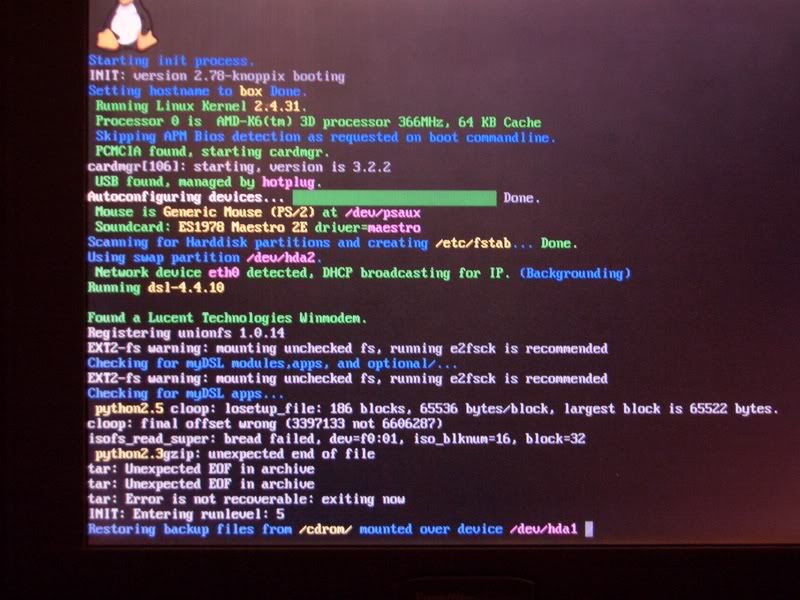EXT2FS error?
Forum: HD Install
Topic: EXT2FS error?
started by: Captain Stable
Posted by Captain Stable on Dec. 31 2008,20:35
Hi there.I've installed DSL onto my laptop, and when I boot up I noticed a couple of errors showing.
I've managed to take photos of the screen (because I don't know how to copy/paste boot screens!).
It's just after DSL has located athe built in modem, which i don't use, because I'm on a network.
It says:
(all in white unless specified)
| Code Sample |
Found a Lucent Technologies Winmodem. [That in green] Registering unionfs 1.0.14 EXT2-fs warning: Mounting unchecked fs, running e2fsck is recommended Checking for myDSL modules,apps, and optional/... [That in blue] EXT2-fs warning: Mounting unchecked fs, running e2fsck is recommended Checking for myDSL apps... [that in blue] |
It then goes onto the python errors, which I'm sort of sorting by deleting them and reinstalling.
So: My questions are:
What is an EXT2-fs; why is it giving warnings; is it serious and what is e2fsck that I am supposed to run and how do I do that?
Sorry for what might potentially seem like simply questions - like going to a cooking forum and saying "I've got a potato and it tastes hard. Should I cook it first and how?", but we all have to learn somewhere...
Posted by Captain Stable on Dec. 31 2008,20:37

That's the photo of the screen, if it's any use.
Posted by mikshaw on Jan. 04 2009,12:55
ext2 is a disk filesystem. If you've heard of fat32 or ntfs, this is in the same category...it's basically a format used by an operating system to store and organize data on a disk. Over time, through constant writing and rewriting, the files on a disk become fragmented, which slows your system and increases the chance of data corruption. The ext2 filesystem requires an occasional check to keep things in order, and it has a tracking system to monitor how many times a disk has been mounted since it was last checked. The warning you see is a recommendation to run a check on that disk. You can either boot with the "checkfs" boot option (which should automatically check and then reboot the system), or boot a CD or pendrive without mounting the harddrive (no loading uci/unc extensions, no persistent home or opt) and use the command "sudo fsck /dev/hda1".Your python2.3 package is broken. Maybe the download is incomplete, or your harddrive is so jumbled that the file was corrupted (large files are often the first to die).